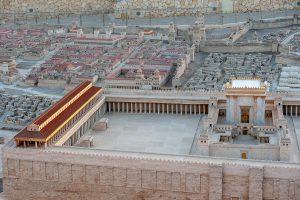In a twist on the famous quote, Desmond Tutu once said, “We learn from history that we don’t learn from history!” In other words, humans keep making the same mistakes.
 A recent reading in 2 Chronicles highlighted this truth for me. After King Solomon’s death, Israel divided into two separate entities, the southern and northern kingdoms. The northern kingdom (Israel) had established their own worship, refusing to acknowledge the temple and the priestly sacrificial system as the only acceptable means of receiving forgiveness and pleasing God. Though imperfectly, the southern kingdom (Judah) tended more towards obedience. And King Jehoshaphat–the fourth ruler–had acted in greater faith and walked in closer alignment with God’s will than any previous king of Judah. The southern tribes enjoyed peace and prosperity during the first years of his reign.
A recent reading in 2 Chronicles highlighted this truth for me. After King Solomon’s death, Israel divided into two separate entities, the southern and northern kingdoms. The northern kingdom (Israel) had established their own worship, refusing to acknowledge the temple and the priestly sacrificial system as the only acceptable means of receiving forgiveness and pleasing God. Though imperfectly, the southern kingdom (Judah) tended more towards obedience. And King Jehoshaphat–the fourth ruler–had acted in greater faith and walked in closer alignment with God’s will than any previous king of Judah. The southern tribes enjoyed peace and prosperity during the first years of his reign.
 Then one day Jehoshaphat had an idea. Believing the kingdoms should unite, Jehoshaphat decided to join forces with King Ahab (the most evil king in Israel’s history) in a battle. Long story short, Ahab set Jehoshaphat up. By God’s grace, Jehoshaphat survived and scheming Ahab died in battle. But that decision to align with a godless ruler opened the door for an attack against Judah. Soon numerous enemies surrounded the southern kingdom–a recipe for utter defeat. But Jehoshaphat and his countrymen cried out to God, asking for mercy and wisdom. Miraculously, Judah’s enemy armies destroyed one another, without Jehoshaphat’s soldiers even fighting!
Then one day Jehoshaphat had an idea. Believing the kingdoms should unite, Jehoshaphat decided to join forces with King Ahab (the most evil king in Israel’s history) in a battle. Long story short, Ahab set Jehoshaphat up. By God’s grace, Jehoshaphat survived and scheming Ahab died in battle. But that decision to align with a godless ruler opened the door for an attack against Judah. Soon numerous enemies surrounded the southern kingdom–a recipe for utter defeat. But Jehoshaphat and his countrymen cried out to God, asking for mercy and wisdom. Miraculously, Judah’s enemy armies destroyed one another, without Jehoshaphat’s soldiers even fighting!
 Lesson learned, right? Wrong! Years later Jehoshaphat allied himself with Ahab’s wicked son. They invested lots of time and resources building ships together to establish a new trade route, but God strongly disapproved. Soon storms destroyed the entire fleet!
Lesson learned, right? Wrong! Years later Jehoshaphat allied himself with Ahab’s wicked son. They invested lots of time and resources building ships together to establish a new trade route, but God strongly disapproved. Soon storms destroyed the entire fleet!
Assuming Jehoshaphat’s motive in both cases was Israeli unity, his good intentions fell flat. He thought these clever solutions, albeit political, would solve a spiritual problem. (Interestingly, throughout all of human history, no political solution has ever solved our spiritual problem–but the politicians keep trying!)
 Politics aside, we may justify our actions with the most heartfelt, noble-sounding rationale–as Jehoshaphat may have done, and as Israel’s first king, Saul, did before him (see 1 Samuel 15). But God is not obligated to go along with our agenda when it fails to align with His! Always higher, His ways are not our fleshly ways (Isaiah 55:8-9). Our plan may make perfect sense to us, but He looks at our motives (Proverbs 16:2)
Politics aside, we may justify our actions with the most heartfelt, noble-sounding rationale–as Jehoshaphat may have done, and as Israel’s first king, Saul, did before him (see 1 Samuel 15). But God is not obligated to go along with our agenda when it fails to align with His! Always higher, His ways are not our fleshly ways (Isaiah 55:8-9). Our plan may make perfect sense to us, but He looks at our motives (Proverbs 16:2)
 In what ways do we fall prey to good intentions? One example from my own life has involved letting others tell me what causes to support and how, instead of consulting God. Another has been to sometimes cave to peer pressure to be what others tell me I should be instead of embracing and standing strong in who God made me to be. A third has been my efforts to fix a situation but going about it the wrong way because I never stopped to ask for wisdom.
In what ways do we fall prey to good intentions? One example from my own life has involved letting others tell me what causes to support and how, instead of consulting God. Another has been to sometimes cave to peer pressure to be what others tell me I should be instead of embracing and standing strong in who God made me to be. A third has been my efforts to fix a situation but going about it the wrong way because I never stopped to ask for wisdom.
But I’m learning from my mistakes–and so can you! Just take the time to pray. God will never steer you wrong.

